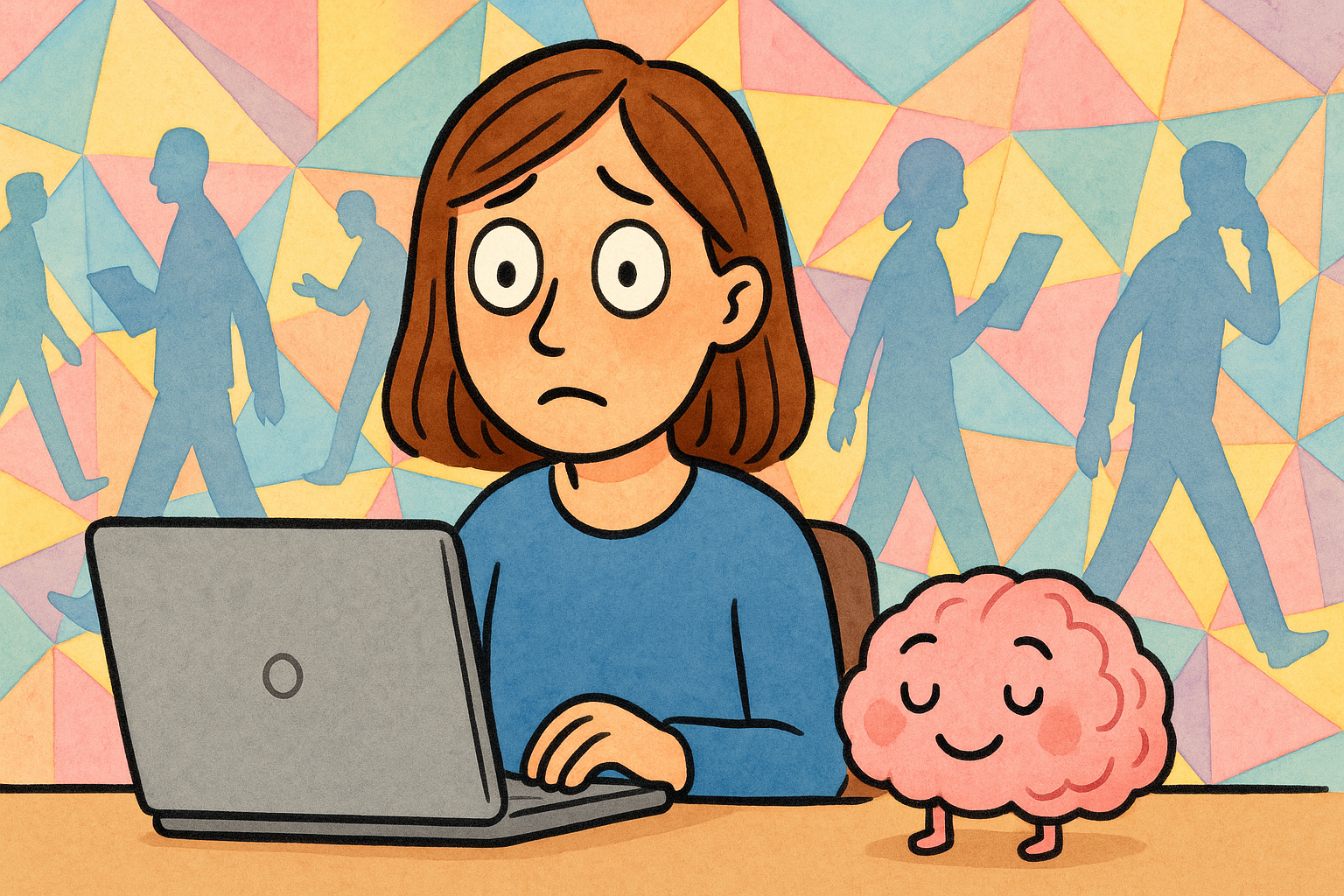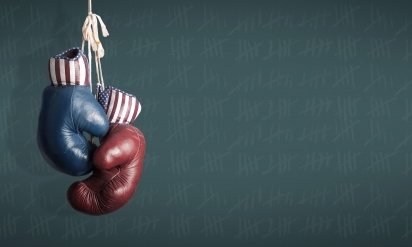Why It Took Me So Long to Start Writing Again (and What Behavioral Science Has to Say About It)
May 3
·
Reading time: 8 minutes
- I took a break from writing this blog for three years and realized it’s damn hard to restart.
- There are five key behavioral reasons why getting back into something feels so much harder than starting it in the first place:
- No recent proof = no confidence.
- Your identity quietly shifts.
- You get caught up in the Perfectionist Trap.
- Social media makes FOMO turn into FOBO.
- Motivation doesn’t show up first, action does.
- There are three key takeaways that can help you get unstuck if you find yourself in a similar situation.

Back in 2022, I took a break from blogging during maternity leave. Expected. Necessary.
The plan was to “jump back in” when things settled down. They eventually did, and yet there were no new blog posts. In fact, the longer the break lasted, the harder it became to return. Suddenly, what used to be “just a blog post” or “just a LinkedIn post” seemed to have grown in my head into something so massive and overwhelming it could only rival the terrifying vision of writing my PhD thesis (before I actually wrote it, of course).
But hey, I’m a behavioral scientist whose brain thrives on solving human psychology puzzles, so I thought this was a perfect opportunity to explore it. Let’s unpack this together, shall we?
The plan was to “jump back in” when things settled down. They eventually did, and yet there were no new blog posts. In fact, the longer the break lasted, the harder it became to return. Suddenly, what used to be “just a blog post” or “just a LinkedIn post” seemed to have grown in my head into something so massive and overwhelming it could only rival the terrifying vision of writing my PhD thesis (before I actually wrote it, of course).
But hey, I’m a behavioral scientist whose brain thrives on solving human psychology puzzles, so I thought this was a perfect opportunity to explore it. Let’s unpack this together, shall we?
Five Behavioral Reasons Restarting Feels So Daunting
1. When you stop doing something, you stop generating proof you can do it… and your brain thinks that means you can’t.
Confidence isn’t a fixed trait. It’s about what you did last Thursday. It’s built through small wins and recent evidence. Whenever you accomplish something, you generate proof for your brain that you can do it. This is exactly what Albert Bandura laid out in Self-Efficacy Theory — confidence comes from mastery experiences.
So, what happened when I stopped blogging? I stopped generating proof. Without fresh evidence, my brain filled that gap — let’s call it the “No Proof That I Can Do It Gap” — with anxious and paranoid thoughts that I couldn’t do it anymore. I mean, who am I to even think that I could?
In reality, my skills hadn’t changed, but without recent reinforcement, belief in those skills slowly eroded. The longer the gap lasted, the more “evidence” my brain had to tell me that I couldn’t do it.
So, what happened when I stopped blogging? I stopped generating proof. Without fresh evidence, my brain filled that gap — let’s call it the “No Proof That I Can Do It Gap” — with anxious and paranoid thoughts that I couldn’t do it anymore. I mean, who am I to even think that I could?
In reality, my skills hadn’t changed, but without recent reinforcement, belief in those skills slowly eroded. The longer the gap lasted, the more “evidence” my brain had to tell me that I couldn’t do it.
Behavior → Evidence I Can Do It → Self-Efficacy → Confidence to Do It Again
When behavior stops, this feedback loop breaks.
2. When you stop doing something, you are no longer a person who does it. Your identity shifts.
Identity isn’t something fixed. We become who we are because of what we do. Our actions shape who we think we are — this is the essence of Identity Theory.
Regular blogging reinforced my identity: “I’m someone who writes about ideas.” But the longer I didn’t write, the more I slipped into a different identity: “someone who used to write” (very much past tense). And if I’m someone who used to write, clearly, I no longer write.
This subtle yet profound shift came with a persistent feeling of irrelevance. The past tense — “used to” — signaled to me that my ideas and skills were outdated. The world has moved on (I mean, there is AI now, after all…), and I haven’t. Turning 40 probably didn’t help either.
Of course, this narrative wasn’t going on consciously. It wasn’t until I began analyzing my writing paralysis that I noticed what was happening. These thoughts lurk just beneath awareness, only vaguely surfacing, if at all. When you become aware of them and think about them rationally, they make no sense. My skills haven’t changed. I still have dozens of blog-post ideas each day. Yet, even hidden, these thoughts significantly impact confidence, motivation, and behavior.
The bottom line? When you don't do something long enough, your brain doesn’t just forget how to do it — it forgets you’re the kind of person who can do it.
Regular blogging reinforced my identity: “I’m someone who writes about ideas.” But the longer I didn’t write, the more I slipped into a different identity: “someone who used to write” (very much past tense). And if I’m someone who used to write, clearly, I no longer write.
This subtle yet profound shift came with a persistent feeling of irrelevance. The past tense — “used to” — signaled to me that my ideas and skills were outdated. The world has moved on (I mean, there is AI now, after all…), and I haven’t. Turning 40 probably didn’t help either.
Of course, this narrative wasn’t going on consciously. It wasn’t until I began analyzing my writing paralysis that I noticed what was happening. These thoughts lurk just beneath awareness, only vaguely surfacing, if at all. When you become aware of them and think about them rationally, they make no sense. My skills haven’t changed. I still have dozens of blog-post ideas each day. Yet, even hidden, these thoughts significantly impact confidence, motivation, and behavior.
The bottom line? When you don't do something long enough, your brain doesn’t just forget how to do it — it forgets you’re the kind of person who can do it.
3. The longer the break, the better the comeback has to be, right?
Being on a break led to another behavioral trap: perfectionism. Since I hadn’t shared anything in three years, my comeback had to be brilliant, worthy of breaking such a long silence. A mere blog or LinkedIn post wouldn’t do; it had to be podcast-worthy, maybe even book-worthy.
(Spoiler alert: Because of this way of thinking, I now have a whole concept for my podcast ready, with a detailed list of the first 21 episodes and half a book written, too. But then I stopped working on them, and now they’ve grown into enormous, intimidating projects that must be perfect, too, so who knows if I’ll ever restart working on them…)
This pattern — called the Perfectionism-Procrastination Loop in psychology — is ironically self-defeating. You’re overwhelmed, demotivated… yet weirdly ambitious. You raise the bar so high you trip over it before you even begin.
(Spoiler alert: Because of this way of thinking, I now have a whole concept for my podcast ready, with a detailed list of the first 21 episodes and half a book written, too. But then I stopped working on them, and now they’ve grown into enormous, intimidating projects that must be perfect, too, so who knows if I’ll ever restart working on them…)
This pattern — called the Perfectionism-Procrastination Loop in psychology — is ironically self-defeating. You’re overwhelmed, demotivated… yet weirdly ambitious. You raise the bar so high you trip over it before you even begin.
So that’s what’s been going on inside my head. But there’s another big piece of the puzzle: the outside world.
4. As you sit on the sidelines, you keep looking at the people who are in the race… and that’s not good for your mental health.
As I waited on the sidelines, I tried keeping up by scrolling through LinkedIn. Well, that didn’t help. Seeing hundreds of posts each week triggered intense feelings of FOMO (Fear Of Missing Out), eventually turning into FOBO (Fear Of Being Outpaced).
I had (have!) to keep reminding myself: when we scroll through social media, we’re not comparing ourselves to one person. We’re comparing ourselves to everyone, everywhere, all at once. It’s me — with two small kids at home, juggling work, motherhood, another international move (with a broken leg!), learning a new language — versus Natalia building her coaching business at rocketship speed, Wojtek launching his online course, and Agata becoming a bestselling author (while also running her behavioral consulting business), and dozens of other behavioral scientists, all bragging writing daily about the amazing things they’re doing with AI.
This kind of comparison leaves you feeling two things: overwhelmed and obsolete. Social media is the only race where you’re always losing. All those impressive posts blur into a single daunting question: “Is there still room for me?” Soon enough, the answer is: “Not really.”
We also can’t forget that the never-ending social media feeds create intense cognitive overload. And let’s be honest — creativity doesn’t flow from an overwhelmed, burnt-out brain.
I had (have!) to keep reminding myself: when we scroll through social media, we’re not comparing ourselves to one person. We’re comparing ourselves to everyone, everywhere, all at once. It’s me — with two small kids at home, juggling work, motherhood, another international move (with a broken leg!), learning a new language — versus Natalia building her coaching business at rocketship speed, Wojtek launching his online course, and Agata becoming a bestselling author (while also running her behavioral consulting business), and dozens of other behavioral scientists, all bragging writing daily about the amazing things they’re doing with AI.
This kind of comparison leaves you feeling two things: overwhelmed and obsolete. Social media is the only race where you’re always losing. All those impressive posts blur into a single daunting question: “Is there still room for me?” Soon enough, the answer is: “Not really.”
We also can’t forget that the never-ending social media feeds create intense cognitive overload. And let’s be honest — creativity doesn’t flow from an overwhelmed, burnt-out brain.
5. I waited for motivation (but that’s not how motivation works).
So what did I do? I waited. After all, writing wasn’t mandatory. Because I used to write, I had built a successful enough consulting career that, despite social media and blog silence, companies still came to me with their consumer and employee problems.
I chose the next-best thing: wait until the perfect idea for a Good-Enough-to-Break-Three-Years-of-Silence-Post appeared, and until I felt so motivated that it would just “write itself.”
I probably don’t have to tell you what happened next, right? That’s not how motivation works.
Here’s what psychology tells us:
I chose the next-best thing: wait until the perfect idea for a Good-Enough-to-Break-Three-Years-of-Silence-Post appeared, and until I felt so motivated that it would just “write itself.”
I probably don’t have to tell you what happened next, right? That’s not how motivation works.
Here’s what psychology tells us:
- Daryl Bem’s Self-Perception Theory explains we infer our feelings by observing our actions, not the other way around. Put simply, we first do something, then feel something, and that feeling leads to motivation.
- Daniel Pink lays out the same principle in “Drive”: it’s progress and mastery that create engagement, not the other way around.
- Daniel Goleman writes about how flow and deep focus emerge after you immerse yourself in an activity, not before.
Behavior → Happy Feelings → Motivation to Do It Again
Waiting for motivation is like waiting for the treadmill to move before you start walking. It’s action that generates energy, which then generates motivation. Sometimes, you just have to kick yourself in the butt, get off the couch (or social media) and just do something.
What helped me reboot?
- I stopped reading what other people were bragging writing about. What I’ve realized is that when you’re sitting on the sidelines — you read, but not write — your mindset shifts. It all becomes a zero-sum game: “Person X already did this, so why should I?”
(Side note: Thankfully Imagine Dragons didn’t say, “Why form a Vegas band when The Killers already exist?” I’m glad their internal dialogue wasn’t as absurd as mine.) - I lowered the bar obscenely low. I promised myself mediocre content — not good, just good enough. It got me through writing my PhD, after all.
- I stopped waiting for motivation, clarity, or confidence. I just kicked myself in the butt and started typing. And guess what? Inspiration, joy, and momentum immediately showed up. I honestly can’t wait to write more now. Look out, world!
My Final Takeaway
If you’re stuck trying to (re)start something, remember this: Even if it’s something you love and are objectively good at, you will inevitably hear those internal voices fueled by doubt, anxiety, and overwhelm. Give them exactly ten seconds to talk their nonsense, then politely ignore them. Move over to the “empty box” in your mind and stay there. (Meditation helps, promise.)
Then start again — even if awkwardly and clumsily. One small action at a time, but enough to see and feel progress; until your brain finally remembers the rhythm.
Then start again — even if awkwardly and clumsily. One small action at a time, but enough to see and feel progress; until your brain finally remembers the rhythm.





